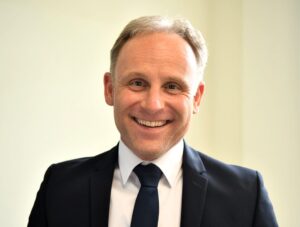
iCARE-AF (integrated CARE for patients with Atrial Fibrillation) clinics at Royal Adelaide Hospital and the Cardiovascular Centre in Norwood have been piloting a novel model of care approach to the treatment and management of Atrial Fibrillation (AF), the most prevalent cardiac arrhythmia with some promising results.
Under the guidance and leadership of Flinders University Caring Futures Institute’s Professor Jeroen Hendriks., the integrated nurse-led care model initiative supported by The Hospital Research Foundation Group, and in collaboration with the Centre for Heart Rhythm Disorders at the University of Adelaide is showing promising outcomes, heralding a new era in patient-centred healthcare.

From its inception, Professor Hendriks has been evaluating the effectiveness of this novel integrated care model, in terms of reducing hospitalisations and mortality, but also crucial patient reported outcomes, such as improvements to their quality of life.
At the core of the iCARE-AF clinics is a person-centred approach, where in their care through education on self-management. The multidisciplinary model then involves collaboration between nurses, cardiologists, patients, and caregivers, ensuring comprehensive care that addresses the whole person, including underlying conditions. The integration of digital technology specifically supports decision-making for the treatment team.
Notably, the model places a strong emphasis on actively involving both patients and their caregivers, fostering a collaborative and supportive care environment. Two hundred patients have enrolled in the study, some have already successfully completed the 24-month program and have experienced the benefits of the nurse-led model of care. Further,
When speaking about the positive impacts of the initiative, Professor Jeroen Hendriks emphasised the importance of ensuring healthcare providers are communicating effectively with their patients, highlighting the need for a more comprehensive approach tailored to individual needs, values and preferences, aligned with clinical guideline recommendations.
“The patients are happy because they have the opportunity to talk to someone about sensitive issues, for example losing weight or quitting smoking, and other lifestyle factors for which there may be no time for in a different setting,” Professor Hendriks explained.
Professor Hendriks envisions this innovative care model as a potential game-changer, aiming to reduce hospitalisations and mortality rates associated with AF. His long-term goal is the national implementation of this model and its application to other chronic conditions, recognising its transformative potential for the broader healthcare landscape.
Recognised for his work on atrial fibrillation, Professor Hendriks recently secured an international; research grant to work with researchers in Sweden, marking a significant step in addressing the high-risk nature of heart failure in a large percentage of AF patients, and vice versa.
The grant will allow Professor Hendriks to collaborate with researchers at Linköping University, a renowned nursing and allied research group 200km from Stockholm. They will compare notes from their respective Heart Failure (HF) and AF programs and identifying gaps to enhance their care.
Recognising the current fragmentation of care and siloed approach, where patients with both HF and AF are required to visit separate clinics for each condition, there is a realisation that this practice results in suboptimal care. Therefore, part of the initiative involves exploring innovative ways to address this issue and develop a novel model of further integrated care for these highly prevalent conditions. The aim is to bridge the existing gaps in healthcare delivery and create a more cohesive and comprehensive approach to managing patients with both HF and AF, ultimately improving the overall quality of care they receive.
The intention is to develop and pilot the model in Sweden, assess results, make necessary adjustments, and subsequently conduct an international trial. The initial pilot data will be utilised for funding applications, both domestically and internationally, contributing to the advancement of care models for HF and AF.
Professor Jeroen Hendriks’ work is undeniably at the forefront of transforming healthcare, showcasing the potential to revolutionise not only AF treatment but also shaping the future of care for chronic conditions.

